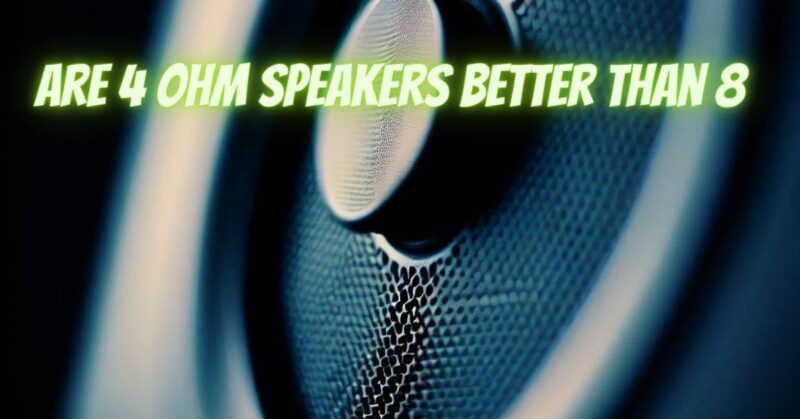The world of audio enthusiasts is filled with choices, and when it comes to speakers, the impedance rating is a key factor that often raises questions. The debate between 4-ohm and 8-ohm speakers is a common one, as enthusiasts seek to understand whether one impedance rating is inherently better than the other. In this article, we’ll dive into the world of speaker impedance and explore whether 4-ohm speakers truly outshine their 8-ohm counterparts.
Understanding Speaker Impedance
Speaker impedance, measured in ohms, represents the resistance the speaker offers to the electrical current coming from the amplifier. This factor significantly affects power distribution, amplifier compatibility, and overall sound quality.
4-Ohm Speakers: Power and Intensity
4-ohm speakers have a lower impedance compared to 8-ohm speakers, which means they draw more current from the amplifier. This can lead to higher power output and potentially louder sound levels. 4-ohm speakers are often chosen for applications where maximizing power and intensity is a priority, such as in car audio systems or high-performance home audio setups.
The advantage of 4-ohm speakers lies in their ability to deliver more power and impact. However, it’s crucial to ensure that the amplifier can handle the increased current demands and that the entire audio system is well-matched to prevent distortion or damage.
8-Ohm Speakers: Balance and Compatibility
8-ohm speakers have a higher impedance, meaning they draw less current from the amplifier. This can result in a more stable power distribution and a lower strain on the amplifier. 8-ohm speakers are often chosen for their compatibility with a wider range of amplifiers and setups.
Using 8-ohm speakers can offer greater flexibility and compatibility, making them suitable for various audio setups without pushing the limits of amplifiers or electrical systems.
Sound Quality Considerations
The superiority of 4-ohm or 8-ohm speakers in terms of sound quality isn’t determined solely by impedance. Other factors, such as speaker design, enclosure type, amplifier quality, and room acoustics, play significant roles in shaping sound quality.
While 4-ohm speakers can provide more power and potentially louder sound, 8-ohm speakers can still deliver impressive sound quality and a balanced listening experience.
Choosing the Right Option
The choice between 4-ohm and 8-ohm speakers should be based on several considerations:
- Sound Intensity: If you seek powerful and intense sound, and your amplifier can handle the load, 4-ohm speakers might be preferable.
- Compatibility: For versatility and compatibility with a wide range of amplifiers, 8-ohm speakers are a practical choice.
- Amplifier Capabilities: Ensure that your amplifier is compatible with the impedance of your chosen speakers to prevent performance issues.
- System Design: Evaluate the overall design of your audio setup, including amplifiers, speakers, and room acoustics.
The belief that 4-ohm speakers are categorically better than 8-ohm speakers requires a nuanced perspective. While 4-ohm speakers can deliver more power and intensity, 8-ohm speakers offer compatibility and stability benefits. The decision ultimately hinges on your audio goals, amplifier capabilities, and the characteristics of your audio setup. Both impedance options can provide impressive sound quality when matched with the right components and properly tuned for optimal performance.


